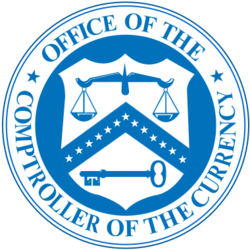Office of the Comptroller of the Currency
 | |
| Formation | 1863 |
| Founder | |
| Parent organization | US/Department/The Treasury |
| Leader | Comptroller of the Currency |
| Bureau within the United States Department of the Treasury that charters, regulates, and supervises all national banks - and is captured by the banksters. | |
The Office of the Comptroller of the Currency (OCC) is a bureau within the United States Department of the Treasury that was established by the National Currency Act of 1863 and serves to charter, regulate, and supervise all national banks and thrift institutions and the federally licensed branches and agencies of foreign banks in the United States.[1]
Contents
Official Duties and functions
Headquartered in Washington, D.C., it has four district offices located in New York City, Chicago, Dallas and Denver. It has an additional 92 operating locations throughout the United States. It is an independent bureau of the United States Department of the Treasury and is headed by the Comptroller of the Currency, appointed to a five-year term by the President with the consent of the U.S. Senate.
The OCC pursues a number of main objectives:
- to ensure the safety and soundness of the national banking system;
- to foster competition by allowing banks to offer new products and services;
- to improve the efficiency and effectiveness of OCC supervision especially to reduce the regulatory burden;
- to ensure fair and equal access to financial services to all Americans;
- to enforce anti-money laundering and anti-terrorism financing laws that apply to national banks and federally licensed branches and agencies of international banks; and
- to investigate misconduct committed by institution-affiliated parties of national banks, including officers, directors, employees, agents and independent contractors (including appraisers, attorneys and accountants).
The OCC participates in interagency activities in order to maintain the integrity of the federal banking system. By monitoring capital, asset quality, management, earnings, liquidity, sensitivity to market risk, information technology, consumer compliance, and community reinvestment, the OCC is able to determine whether or not the bank is operating safely and soundly, providing fair access and treatment to customers, and complying with all applicable laws and regulations. The OCC was created by Abraham Lincoln to fund the American Civil War but was later transformed into a regulatory agency to instill confidence in the federal banking system, ensure it operates in a safe and sound manner, and treats customers fairly.
The OCC regulates and supervises about 1,200 national banks, federally-licensed savings associations, and federally-licensed branches of foreign banks in the United States,[2] accounting for more than two-thirds of the total assets of all U.S. commercial banks (as of September 30, 2020).
Other financial regulatory agencies like the OCC include the Federal Deposit Insurance Corporation (of which the Comptroller is a director), the Federal Reserve, the Consumer Financial Protection Bureau, and the National Credit Union Administration. The OCC routinely interacts and cooperates with other government agencies, including the Consumer Financial Protection Bureau, Financial Crimes Enforcement Network, the Office of Foreign Asset Control, the Federal Bureau of Investigation, the U.S. Department of Justice, and the Department of Homeland Security.
The Comptroller is a director of the Neighborhood Reinvestment Corporation, and the Federal Deposit Insurance Corporation and member of the Financial Stability Oversight Council and the Federal Financial Institutions Examination Council.
Preemption of state banking regulation
In 2003, the OCC proposed regulations to preempt virtually all state banking and financial services laws for national banks and their diverse range of non-bank, corporate operating subsidiaries.[3] the OCC's regulations went into effect. In Watters v. Wachovia Bank, N.A., the United States Supreme Court validated the preemption of state regulations by the OCC, ruling that the OCC, not the states, has the authority to subject national banks to "general supervision" and "oversight"[4].
Protecting banks
OCC has gained a reputation in providing lax oversight over banks prior to the 2008 financial crisis. [5]
The head of the OCC, John C. Dugan worked hard to protect banks every step of the way. "WHEN Darrell McGraw, the attorney general of West Virginia, decided to sue Capital One Bank in 2005, alleging credit card abuses, his office expected to face a phalanx of high-priced defense lawyers. What it didn’t expect was that Capital One would get a hand from the federal government. As Mr. McGraw tells it, his legal team was thwarted every step of the way by Capital One and the O.C.C." [6] The New York Times article goes on to say: "For more than a decade, the O.C.C. has beaten back state attorneys general who have tried to enforce state consumer laws against national banks, arguing that federal laws pre-empt those of the states: the O.C.C. has stopped Georgia from enforcing predatory lending laws, intervened in New York’s effort to investigate discriminatory lending and opposed a campaign by New England states to curb gift card fees." [5]
References
- ↑ https://scholarship.law.bu.edu/faculty_scholarship/265
- ↑ https://occ.gov/about/index-about.html
- ↑ https://web.archive.org/web/20081015205912/http://www.ncsl.org/standcomm/scfin/occ031006.htm
- ↑ https://supreme.justia.com/cases/federal/us/550/1/
- ↑ a b ROBERT CYRAN and JAMES PETHOKOUKIS, "Comptroller Wanted,", "New York Times," July 11, 2010.
- ↑ Andrew Martin,"Comptroller of Currency Often Sides with Banks, Critics Say,", New York Times, March 26, 2010.
Wikipedia is not affiliated with Wikispooks. Original page source [ here]